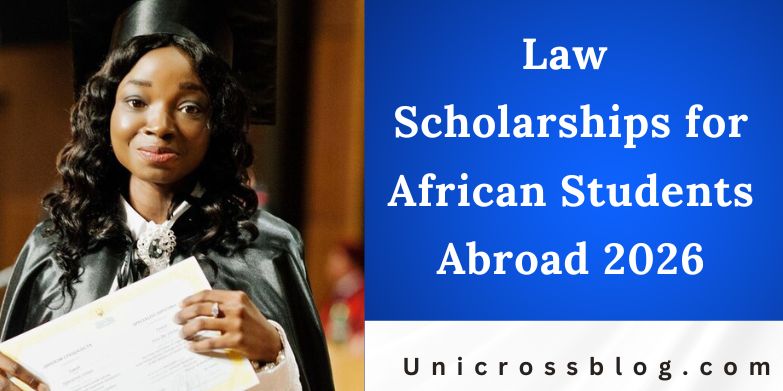Pursuing a law degree abroad can open doors to global legal expertise, international networks, and career opportunities that shape policy and justice systems back home. For African students, scholarships make this dream accessible, covering tuition, living expenses, and sometimes travel. With the 2026 academic intake approaching, opportunities are expanding, driven by organizations committed to Africa’s development. This guide highlights key scholarships tailored for African law students studying overseas, focusing on master’s and PhD levels where law programs thrive. These awards prioritize academic excellence, leadership potential, and a commitment to addressing African challenges like governance, human rights, and sustainable development.

Law Scholarships for African Students Abroad
1. Chevening Scholarships (United Kingdom)
The UK government’s flagship program, Chevening, funds one-year master’s degrees in law-related fields such as international law, human rights, or commercial law at top universities like the London School of Economics (LSE), University of Oxford, or University College London. Open to Africans from all countries, it targets mid-career professionals with at least two years of work experience. Benefits include full tuition, a living stipend of around £18,000, travel costs, and arrival allowances. In 2026, priority goes to applicants focusing on climate justice or digital rights, aligning with global agendas. Successful scholars often return to roles in NGOs, government, or private practice, amplifying Africa’s voice internationally.
2. Margaret Bennett Scholarship for African Women (United Kingdom)
Exclusively for female African students, this LSE-specific award supports the LLM program, emphasizing public international law or human rights. Preference is given to North African applicants, but it’s open continent-wide. Valued at up to £30,000, it covers tuition and partial living costs, with recipients joining a mentorship network of alumni advocating for gender equity in law. For 2026 entry, applications stress essays on women’s legal empowerment in Africa, making it ideal for those eyeing careers in international tribunals or policy reform.
3. Commonwealth Scholarships (United Kingdom and Commonwealth Nations)
Administered by the UK Foreign, Commonwealth & Development Office, these fully funded awards support master’s or PhD studies in law at UK universities or select Commonwealth partners like Canada or Australia. Africans from low- and middle-income countries qualify, with a focus on sustainable development law or migration policy. Coverage includes tuition up to £25,000, a monthly stipend of £1,236 in London (or £1,132 elsewhere), airfare, and thesis grants. The 2026 cycle emphasizes climate and health law, reflecting post-pandemic priorities. Past recipients have influenced African Union policies on refugee rights.
4. DAAD Leadership for Africa Scholarships (Germany)
Germany’s DAAD offers fully funded master’s programs in law, such as international and European law at universities like Humboldt or Heidelberg. Targeted at sub-Saharan Africans, it includes a monthly stipend of €934, health insurance, travel, and study allowances up to €460. Post-graduation, scholars must return home for at least two years to apply skills locally. For 2026, applications open early 2025, prioritizing those committed to anti-corruption or economic law. This program builds bridges between African and EU legal systems, fostering trade and investment expertise.
5. Mastercard Foundation Scholars Program (Multiple Countries)
Partnering with universities like the University of Edinburgh (UK), McGill (Canada), and Stanford (USA), this initiative funds law master’s for talented Africans facing financial barriers. Full coverage spans tuition, accommodation, books, and a living stipend, plus leadership training. The 2026 cohort targets 160 scholars across partners, with law tracks emphasizing social justice and entrepreneurship. Applicants from East and West Africa are encouraged, with a focus on community impact projects. Alumni often lead legal aid organizations, transforming access to justice.
6. Fulbright Foreign Student Program (United States)
The US State Department’s Fulbright supports one- to two-year LLM or SJD programs at American Bar Association-approved schools like Harvard, Yale, or NYU. Open to all Africans, it covers tuition, airfare, health insurance, and a living allowance of $2,000 monthly. For 2026, emphasis is on public interest law, including environmental or tech policy. Selection favors those with clear plans to enhance bilateral ties, such as advising on US-Africa trade pacts. Over 400 Africans have benefited, many now in diplomatic or corporate law roles.
7. Canon Collins Trust Scholarships (South Africa, with International Options)
While primarily for South African universities, Canon Collins extends to Africans pursuing LLM abroad in the UK or Ireland, focusing on human rights or constitutional law. Awards up to £10,000 cover fees and living costs, with additional grants for research. The 2026 deadline is September 2025, requiring a strong academic record and activism history. This scholarship nurtures progressive lawyers, with alumni influencing SADC regional courts.
8. Aga Khan Foundation International Scholarship Programme (Multiple Countries)
For outstanding Africans from select countries (e.g., Kenya, Uganda, Tanzania), this funds postgraduate law studies in Canada, UK, or Europe. Half-grant, half-loan structure provides up to $50,000, repayable interest-free over five years. Applications for 2026 open January, prioritizing community development law. Scholars gain access to the Aga Khan network, supporting roles in Islamic finance or dispute resolution.
9. French Government Eiffel Excellence Scholarships (France)
France’s elite award funds two-year master’s in international law at institutions like Sciences Po or Sorbonne. Valued at €1,181 monthly plus tuition and travel, it’s for top Africans under 25. The 2026 deadline is January, with law tracks on global governance. Recipients join a Franco-African alumni circle, aiding Francophone legal harmonization.
10. Eni-Oxford Africa Scholarship (United Kingdom)
Oxford’s Saïd Business School partners with Eni for MBA-LLM hybrids, fully funding Africans in energy law. Covers £70,000 tuition and £20,000 living costs. For 2026, it seeks leaders tackling Africa’s resource governance. Scholars intern with Eni, blending business and law for sustainable energy transitions.
These scholarships represent a fraction of opportunities; many universities offer merit-based aid too. Total funding exceeds $10 million annually for African law aspirants, per recent trends.
Application Tips
Start early: Deadlines cluster from September 2025 to March 2026. Tailor personal statements to show how your legal training will drive African progress, backed by 2-3 recommendation letters. Secure transcripts and English proficiency (IELTS/TOEFL) scores. Network via alumni groups for insider advice. Budget for visas and interviews. Persistence pays: Reapply if needed, refining based on feedback.
READ ALSO: How to Prepare for the MCAT for Canadian Medical Schools
FAQs
Who qualifies for these scholarships?
Typically, African nationals with a bachelor’s in law or related field, GPA above 3.5/4.0, and 1-2 years’ experience. Leadership and financial need are key.
Are scholarships only for master’s?
Mostly, but PhDs like Fulbright SJD exist. Undergrads should explore broader programs like Commonwealth Distance Learning.
What if I’m from a specific African region?
Many prioritize sub-Saharan or North Africa, but most are continent-wide. Check eligibility per award.
Do I need to repay the funds?
Most are grants, but Aga Khan is partial loan. Always review terms.
How competitive are they?
High, with acceptance rates under 10%. Strong essays and references boost chances.







